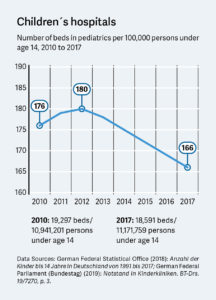The growing lack of doctors, nurses and midwives, and the closure of specialist and maternity clinics, is alarming. Access is particularly at risk in rural regions, where a number of paediatric departments have been closed down in recent years, further closures are imminent for economic reasons, and there is a shortage of skilled workers. Over the next 10 to 15 years, demographic trends will see a disproportionate number of paediatricians retiring, with no successors to replace them. With specialist paediatric qualifications remaining the same or declining, Germany is heading for a massive undersupply in both inpatient and outpatient care.
 More and more paediatric treatment capacities are also being cut at hospitals for economic reasons. When children are treated by doctors or nurses trained in treating adult patients, it is not always possible to guarantee these children will receive medical, psychosocial and nursing care appropriate to their age. For example, basic inpatient care for children and adolescents at paediatric departments is not taken into account at all in legal regulations or directives issued by Germany’s Federal Joint Committee. This only applies to internal medicine and surgerydepartments.
More and more paediatric treatment capacities are also being cut at hospitals for economic reasons. When children are treated by doctors or nurses trained in treating adult patients, it is not always possible to guarantee these children will receive medical, psychosocial and nursing care appropriate to their age. For example, basic inpatient care for children and adolescents at paediatric departments is not taken into account at all in legal regulations or directives issued by Germany’s Federal Joint Committee. This only applies to internal medicine and surgerydepartments.
Access to medical care for refugee children and adolescents
The access to medical care granted to children and adolescents who have fled to Germany as refugees is problematic. While unaccompanied refugee minors do legally, but not actually, have access to full legal health-insurance benefits, refugee children and adolescents who arrive in Germany with their parents are, for the first 15 months, only entitled to treatment for acute illness or treatment essential to maintaining health. Access to psychosocial care is very limited for unaccompanied and accompanied children and adolescents. Preventive health care and psychotherapeutic support are thus rarely provided. In addition to legal hurdles, this is also due to language barriers and a lack of knowledge of the German health system – and has serious consequences for the children’s further development.
Male circumcision
Section 1631d of the German Civil Code (BGB) allows parents who have custody of their children to consent to a non-medically-required circumcision of male children not yet able to make their own decisions or judgements, if performed in accordance with the latest medical standards. Around 10.9 percent of boys in Germany are circumcised. Even under optimum medical conditions, the expected rate of complications is approximately 5 percent, with a higher rate anticipated for newborns. At least 400 boys a year require hospitalisation due to medical complications resulting from circumcision. The complications range from post-operative bleeding and wound infections to scarring, agglutination or penis amputation.
- The National Coalition Germany recommends that the UN Committee call on the German federal government to
- 92. Grant all children and adolescents unrestricted access to health care, including health promotion, preventive services and rehabilitation;
- 93. Take measures ensuring adequately qualified paediatric care by both doctors and nurses in order to counteract the shortage of doctors anticipated for the medium and long term. The number of medical-school placements must also be promptly and significantly raised as part of the 2020 master plan for medical studies, and nursing course options similarly increased;
- 94. Adapt the requirements, particularly regarding children’s and adolescents’ accessibility to comprehensive basic care by specialist paediatric departments at hospitals, to equalize the basic-care requirements for adult patients;
- 95. Expand the medical care services so that refugee children are equally entitled to a maximum state of health, and particularly to appropriate treatments for trauma;
- 96. Commission research projects which highlight the actual impacts and possible target discrepancies in the existing Section 1631d BGB (male circumcision), and the causes thereof;
- 97. Assess whether and the extent to which the legal situation in Germany and its implementation complies with the UN Convention on the Rights of the Child in terms of male circumcision. For this assessment, current national and international knowledge of legal, medical, psychological and social-science matters needs to be taken into account, and civil-society organisations including interest groups should be involved.